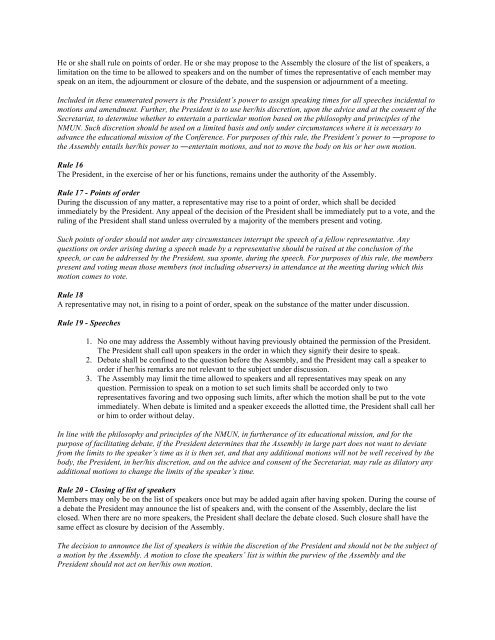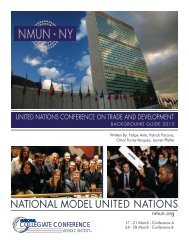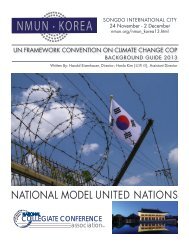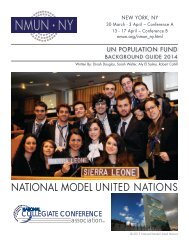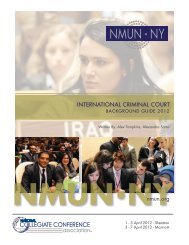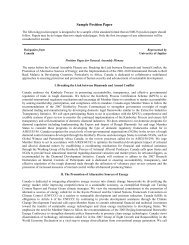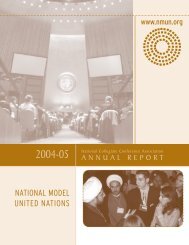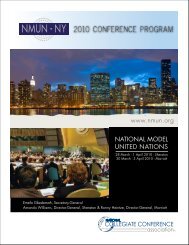Organization of American States - National Model United Nations
Organization of American States - National Model United Nations
Organization of American States - National Model United Nations
You also want an ePaper? Increase the reach of your titles
YUMPU automatically turns print PDFs into web optimized ePapers that Google loves.
He or she shall rule on points <strong>of</strong> order. He or she may propose to the Assembly the closure <strong>of</strong> the list <strong>of</strong> speakers, a<br />
limitation on the time to be allowed to speakers and on the number <strong>of</strong> times the representative <strong>of</strong> each member may<br />
speak on an item, the adjournment or closure <strong>of</strong> the debate, and the suspension or adjournment <strong>of</strong> a meeting.<br />
Included in these enumerated powers is the President’s power to assign speaking times for all speeches incidental to<br />
motions and amendment. Further, the President is to use her/his discretion, upon the advice and at the consent <strong>of</strong> the<br />
Secretariat, to determine whether to entertain a particular motion based on the philosophy and principles <strong>of</strong> the<br />
NMUN. Such discretion should be used on a limited basis and only under circumstances where it is necessary to<br />
advance the educational mission <strong>of</strong> the Conference. For purposes <strong>of</strong> this rule, the President’s power to !propose to<br />
the Assembly entails her/his power to !entertain motions, and not to move the body on his or her own motion.<br />
Rule 16<br />
The President, in the exercise <strong>of</strong> her or his functions, remains under the authority <strong>of</strong> the Assembly.<br />
Rule 17 - Points <strong>of</strong> order<br />
During the discussion <strong>of</strong> any matter, a representative may rise to a point <strong>of</strong> order, which shall be decided<br />
immediately by the President. Any appeal <strong>of</strong> the decision <strong>of</strong> the President shall be immediately put to a vote, and the<br />
ruling <strong>of</strong> the President shall stand unless overruled by a majority <strong>of</strong> the members present and voting.<br />
Such points <strong>of</strong> order should not under any circumstances interrupt the speech <strong>of</strong> a fellow representative. Any<br />
questions on order arising during a speech made by a representative should be raised at the conclusion <strong>of</strong> the<br />
speech, or can be addressed by the President, sua sponte, during the speech. For purposes <strong>of</strong> this rule, the members<br />
present and voting mean those members (not including observers) in attendance at the meeting during which this<br />
motion comes to vote.<br />
Rule 18<br />
A representative may not, in rising to a point <strong>of</strong> order, speak on the substance <strong>of</strong> the matter under discussion.<br />
Rule 19 - Speeches<br />
1. No one may address the Assembly without having previously obtained the permission <strong>of</strong> the President.<br />
The President shall call upon speakers in the order in which they signify their desire to speak.<br />
2. Debate shall be confined to the question before the Assembly, and the President may call a speaker to<br />
order if her/his remarks are not relevant to the subject under discussion.<br />
3. The Assembly may limit the time allowed to speakers and all representatives may speak on any<br />
question. Permission to speak on a motion to set such limits shall be accorded only to two<br />
representatives favoring and two opposing such limits, after which the motion shall be put to the vote<br />
immediately. When debate is limited and a speaker exceeds the allotted time, the President shall call her<br />
or him to order without delay.<br />
In line with the philosophy and principles <strong>of</strong> the NMUN, in furtherance <strong>of</strong> its educational mission, and for the<br />
purpose <strong>of</strong> facilitating debate, if the President determines that the Assembly in large part does not want to deviate<br />
from the limits to the speaker’s time as it is then set, and that any additional motions will not be well received by the<br />
body, the President, in her/his discretion, and on the advice and consent <strong>of</strong> the Secretariat, may rule as dilatory any<br />
additional motions to change the limits <strong>of</strong> the speaker’s time.<br />
Rule 20 - Closing <strong>of</strong> list <strong>of</strong> speakers<br />
Members may only be on the list <strong>of</strong> speakers once but may be added again after having spoken. During the course <strong>of</strong><br />
a debate the President may announce the list <strong>of</strong> speakers and, with the consent <strong>of</strong> the Assembly, declare the list<br />
closed. When there are no more speakers, the President shall declare the debate closed. Such closure shall have the<br />
same effect as closure by decision <strong>of</strong> the Assembly.<br />
The decision to announce the list <strong>of</strong> speakers is within the discretion <strong>of</strong> the President and should not be the subject <strong>of</strong><br />
a motion by the Assembly. A motion to close the speakers’ list is within the purview <strong>of</strong> the Assembly and the<br />
President should not act on her/his own motion.


